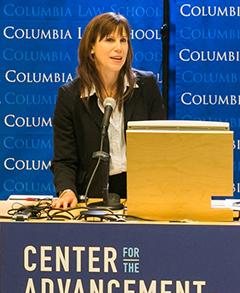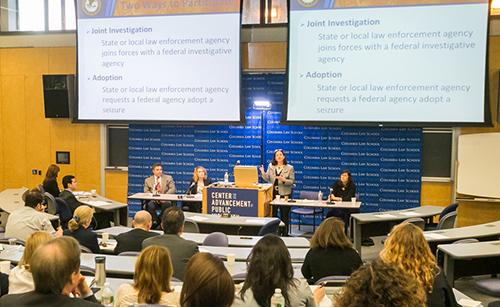Center for the Advancement of Public Integrity Explores 'Busting Graft and Boosting Budgets'
The Center's Inaugural Conference Convenes Officials and Watchdogs to Offer Insights on Asset Forfeiture
New York, June 18, 2014—When oversight authorities hold white-collar criminals accountable for stealing from the public, they can use recovered assets to bolster agency budgets for future investigations, said an array of officials and watchdogs at the Center for the Advancement of Public Integrity’s (CAPI) inaugural conference May 30 at Columbia Law School.
| Jennifer Rodgers, a former assistant U.S. attorney, is executive director of the center. |
The daylong event, “Busting Graft and Boosting Budgets: How Oversight Authorities Can Expand Their Arsenals through Asset Forfeiture and Other Tools,” explored how inspectors general, investigators, and law enforcement can make the most of asset forfeiture. The conference was the first major event of CAPI, a research center recently established as a partnership between Columbia Law School and New York City’s Department of Investigation. The center is devoted to improving the capacity of public offices and practitioners to deter, identify, and combat governmental corruption.
“Big cities face similar issues around the world—whether here in New York or Rio or Delhi or Paris or Hong Kong—of procurement fraud, construction fraud, and incursion of organized crime,” said Jennifer Rodgers, executive director of CAPI and a former assistant U.S. attorney, in a session laying out the center’s objectives. “The center aims to provide practitioners with helpful resources and tools, advance research with practical implications, and build and support a vibrant public integrity community.”
After introductory remarks from Rodgers and Philip Zisman, Executive Director of the Association of Inspectors General, the conference began with a lively panel on how various government agencies utilize asset forfeiture to enhance their operations.
“Most crimes are not about passion, but about money,” said Sharon Cohen Levin, chief of the Money Laundering and Asset Forfeiture Unit in the criminal division of the U.S. Attorney’s office for the Southern District of New York, who has overseen more than $9 billion in forfeitures in recent years. “Asset forfeiture is about taking the profit out of crime.”
Two categories of property are subject to forfeiture once probable cause has been established, the experts explained: proceeds, or property obtained directly or indirectly through crime; and properties that facilitated the crime, such as real estate, automobiles, planes, and boats. While criminal forfeiture requires a conviction and applies only to property in the perpetrator’s name, civil forfeiture is more flexible and can apply to a wider range of assets.
State and local agencies are eligible to share asset forfeiture proceeds if they participate in Equitable Sharing Programs at the Departments of Justice and Treasury, which divide takings equitably between agencies based on their roles in federal investigations.
“The value must cross minimum monetary thresholds, and sharing is based on net proceeds after claims and costs,” said Alice W. Dery, deputy chief for the Policy and Training Unit in the Asset Forfeiture and Money Laundering Section at the Criminal Division of the Department of Justice. “You have to be very careful with assets, because you don’t want to take on a liability from a perp.”
FBI Supervisory Special Agent Douglas Leff, an expert in organized crime, shared colorful anecdotes of past criminal conduct that brought the room to laughter, including photographic evidence of a fraudster painting false hurricane damage on her car. Later, in an in-depth case study, a panel broke down the half-billion dollar CityTime fraud, which involved extensive abuse of an effort to reform New York City’s dysfunctional payroll system. Additional sessions addressed best practices for investigatory interviews and how effective oversight contributes to economic prosperity.
Video recordings, PowerPoint presentations and other materials from the conference are now online. Click here for more information about the speakers and presentations.
| Panelists described how asset forfeiture can be used to bolster agency budgets. |

